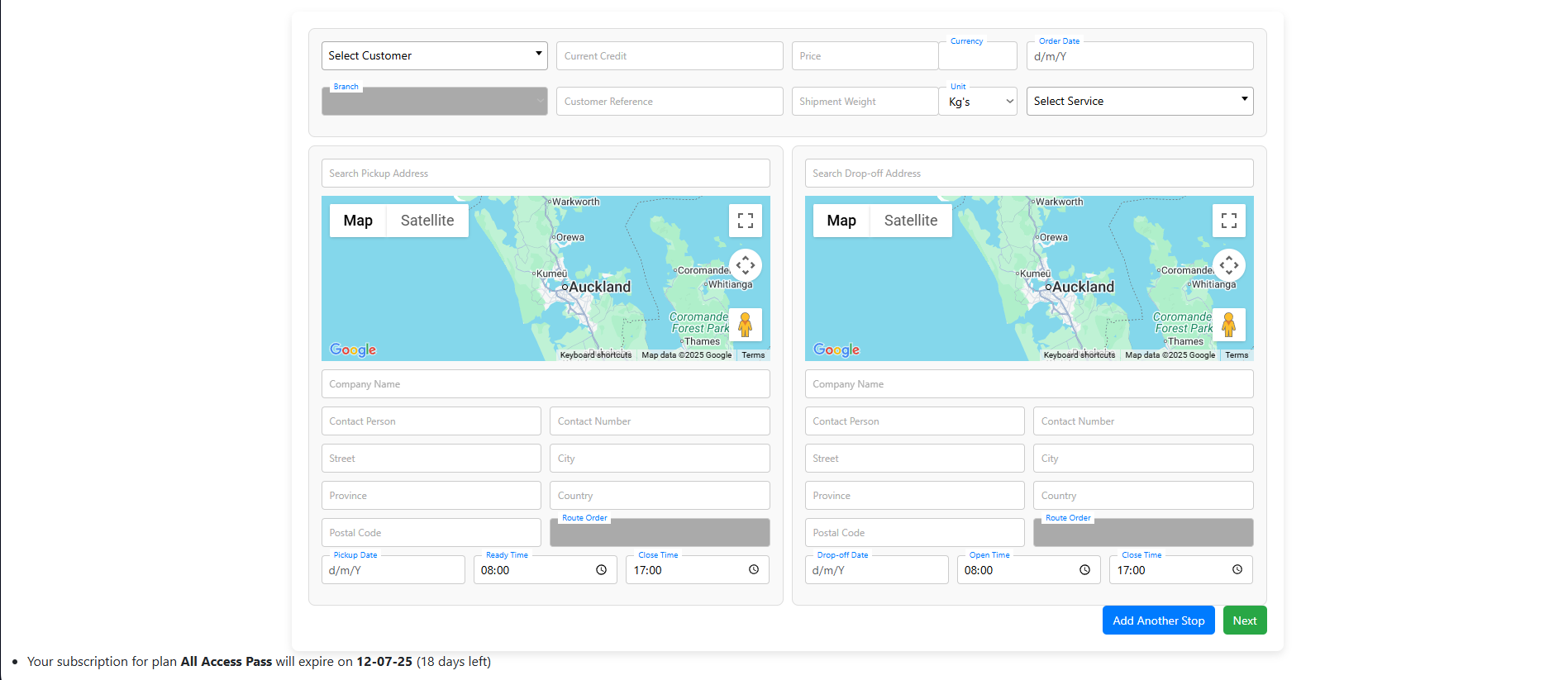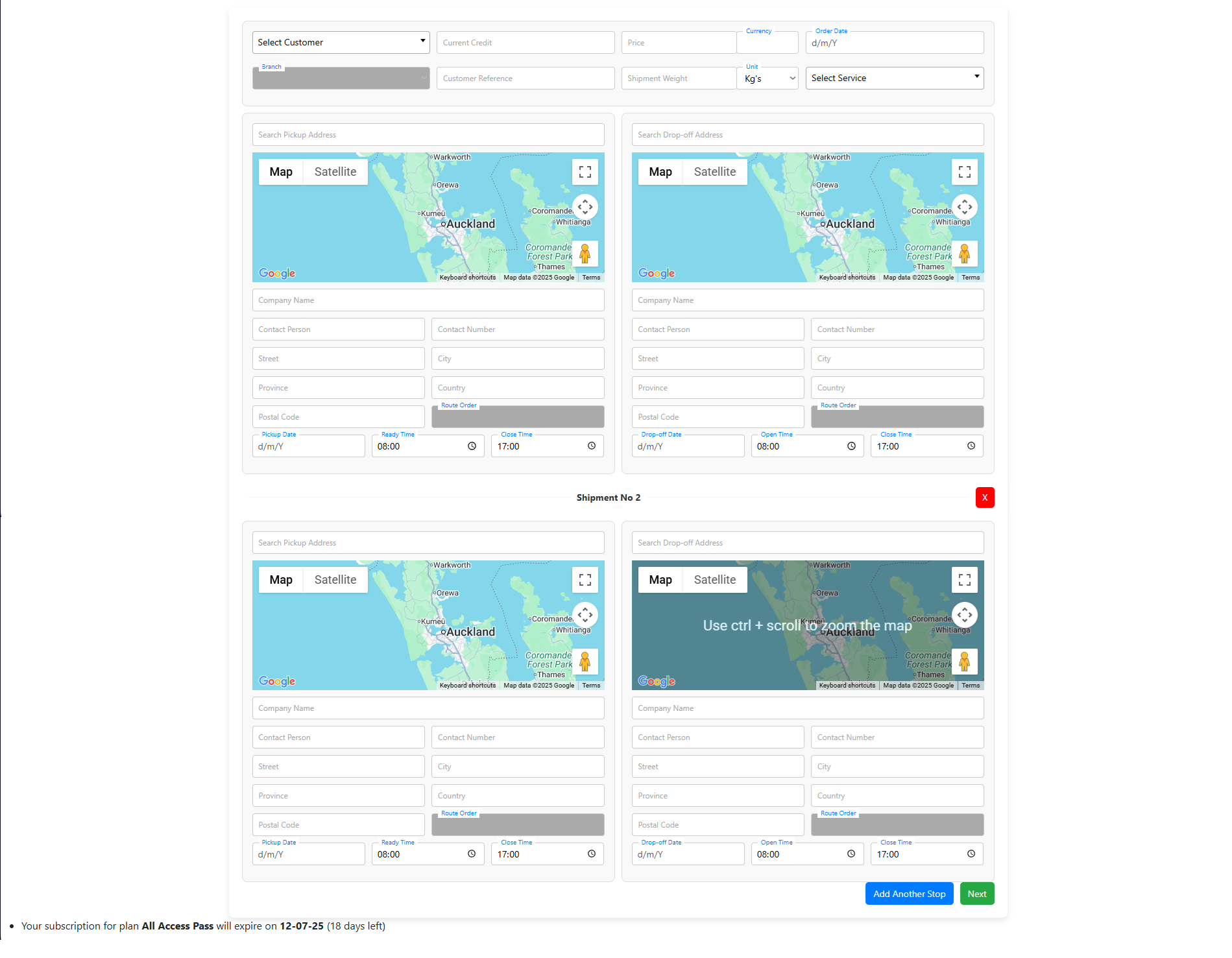Create Shipment – Logistics, Multi-drop, and Route Planning in Transport Management Software | iShiply.com
Create
The Create Shipment page is your launchpad for efficient, compliant deliveries in iShiply's transport management software system. Easily handle single shipments or complex multi-drop routes for your logistics, courier, and freight operations—packed with smart features for seamless shipping, route planning, and fleet management.

Single Pickup & Drop Off
The most common workflow: Create a shipment from a single pickup location to a single drop-off location. This is perfect for standard delivery jobs, one-off consignments, or when you want to keep things simple.
- Select Customer: Choose the customer for whom you're booking the shipment. This links the shipment to their account, applies any customer-specific pricing, and ensures the job is visible in their dashboard.
- Current Credit: See the customer's available credit (if enabled). Useful for account customers with credit limits.
- Price & Currency: Enter the price for this shipment and select the appropriate currency (if multi-currency is enabled).
- Order Date: The date the shipment is created or scheduled. Default is today, but you can backdate or schedule into the future.
- Branch: Select which branch or depot is responsible for this shipment. Ensures the job is managed by the right team.
- Customer Reference: Enter the customer’s order/job number or any tracking code they supply. Appears on all documents and is searchable.
- Shipment Weight & Unit: Enter total weight and choose units (e.g., Kg’s, Lbs). Critical for pricing, vehicle assignment, and compliance.
- Select Service: Pick the correct service level (e.g., Standard, Express, Refrigerated, etc). Service types might affect pricing, scheduling, and vehicle choice.
Pickup & Drop-off Address Sections
- Search Address: Start typing any address (Google Maps autocomplete) for fast, accurate entry. Pinpoint the location instantly.
- Map/Satellite View: Visualize exact pickup/drop-off on the map. Drag or click to adjust the pin if needed!
- Company Name: The business, warehouse, or entity at this location.
- Contact Person & Contact Number: The best person to reach at this stop, and their phone number. Drivers see this in their manifests.
- Street, City, Province, Country, Postal Code: All address details are auto-filled from the map, but you can adjust anything for total accuracy.
- Route Order: (Usually auto-set). If adding multiple stops, this determines the sequence (1 = first stop, 2 = second, etc.).
- Pickup/Drop-off Date: The date the pickup or drop is scheduled.
- Ready/Open Time: The earliest time the goods will be ready for the driver.
- Close Time: The latest time the driver can arrive.
Best Practice: Double-check addresses on the map, and always add a contact number to avoid failed deliveries!

Multi-Drop / Multiple Shipments for One Driver or Vehicle
Need to send a driver on a run with several pickups and drop-offs? Our multi-drop feature means you can add as many shipments as you need—just click Add Another Stop! Each set of pickup/drop-off fields creates a new shipment for the same driver or vehicle, letting you plan complex routes and maximize efficiency.
- Add Another Stop: Instantly creates a new shipment section below. Each section has its own pickup/drop-off, address, contact, times, and route order. You can remove extra stops with the red (X) button.
- Shipment No.: Each additional shipment is numbered for clarity. You can drag and reorder stops if needed (if your system supports drag-and-drop).
- Route Order: Make sure each stop is in the correct sequence for the driver. The system will optimize if possible, but you have full manual control.
- All Fields Above Apply: Every pickup/drop-off pair has the same fields as a single shipment (address, contact, time window, etc.), so you can customize each one.
Pro Tip: Use multi-drop to combine deliveries and reduce costs—just make sure your route order matches the driver’s real-world plan!
Shipment Workflow
- Select your customer and fill in main shipment details (price, reference, service, etc.).
- Enter pickup and drop-off address details. Use the map for accuracy and fill in all contact info.
- (Optional) Click Add Another Stop to add more shipments for the same driver/vehicle.
- Set route order and schedule times for each stop to control the driver’s workflow.
- Double-check all details, then click Next to review and confirm your shipments.
Pro Tips & Best Practices
- Use Google Maps autocomplete for speed and accuracy—avoid manual typos in your logistics workflows.
- Fill in all contact numbers for every stop—drivers rely on these!
- Ready/Open and Close times help drivers plan. Be realistic to avoid missed windows and optimize fleet routes.
- For multi-drop jobs, plan your route order for the most efficient path (or let the system optimize if available for your transport management solution).
- Always check route order and address on the map before finalizing your shipment creation.
- If you’re unsure about any field, hover for tooltips or ask support!
Frequently Asked Questions
- Can I create a shipment without a customer?
No, a customer is required for every shipment to ensure proper tracking, billing, and compliance in your logistics management system. - Is there a limit to the number of stops in a multi-drop shipment?
The system supports dozens of stops, but check with your plan or admin for any specific limits in your transport management software. - Can I reorder stops after adding them?
Yes, you can drag and reorder stops if your system supports this feature. - What if the address autocomplete doesn't find my location?
You can manually enter or adjust all address fields after using the map for best accuracy. - Do I need to fill in Ready/Open and Close times?
They're optional, but highly recommended for efficient driver scheduling and fewer missed deliveries.